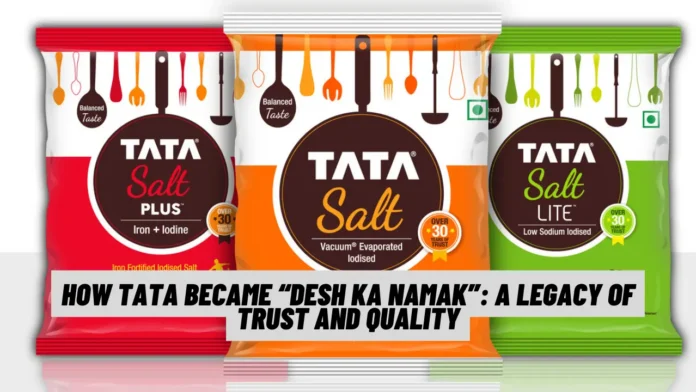In India, the phrase “Desh Ka Namak” (The Nation’s Salt) resonates deeply with Tata Salt, a brand that has become synonymous with purity, trust, and quality. Since its launch in 1983, Tata Salt has not only revolutionized the Indian salt industry but also embedded itself in the cultural fabric of the nation. This article explores the journey of Tata Salt, from its inception to becoming a household name in India.
The Genesis of Tata Salt
The story of Tata Salt begins with a vision to provide iodized, pure, and affordable salt to millions of Indian households. Before Tata Salt entered the market, the Indian salt industry was fragmented, with widespread issues of adulteration and inconsistent quality. The Tata Group, known for its commitment to nation-building and quality products, saw an opportunity to make a significant impact.
Key Milestones:
- 1983: Tata Chemicals launched Tata Salt as India’s first national branded iodized salt.
- Innovation: Tata Salt introduced vacuum-evaporation technology, ensuring the highest purity and consistent quality.
- Iodization: Addressing the critical issue of iodine deficiency in India, Tata Salt was fortified with iodine, contributing to public health.
Building Trust and Quality
Tata Salt’s success can be attributed to its unwavering commitment to quality and trust. The brand promised “Namak Ho Tata Ka – Tata Ka Matlab Vishwas” (If it’s Tata’s salt, it means trust), and lived up to it. This trust was not just a marketing slogan but a reflection of Tata’s legacy of integrity and consumer focus.
Factors Contributing to Success:
- Quality Assurance: Rigorous quality control processes ensured that every pack of Tata Salt met high standards of purity and consistency.
- Widespread Availability: By establishing a robust distribution network, Tata Salt reached even the remotest parts of India, making quality salt accessible to all.
- Consumer Education: Tata Salt played a crucial role in educating consumers about the importance of iodized salt for health.
Becoming “Desh Ka Namak”
Over the years, Tata Salt has grown beyond just a product to become a symbol of trust and a part of Indian culture. The term “Desh Ka Namak” encapsulates Tata Salt’s position as a staple in Indian kitchens, trusted by millions.
Cultural Impact:
- Advertising Campaigns: Memorable advertising campaigns highlighted Tata Salt’s purity and trustworthiness, strengthening its emotional connection with consumers.
- Community Initiatives: Tata Salt’s involvement in social causes, such as addressing iodine deficiency and supporting local communities, reinforced its commitment to national well-being.
Expanding the Brand
Tata Salt’s success paved the way for diversification into various salt products and beyond. Today, Tata Salt offers a range of products, including low-sodium salt, rock salt, and other specialty salts, catering to diverse consumer needs.
Product Line Expansion:
- Tata Salt Lite: A low-sodium variant for health-conscious consumers.
- Tata Black Salt and Tata Rock Salt: Catering to traditional and gourmet culinary needs.
- Tata Salt Plus: Enriched with iron to combat anemia.
Key Takeaways
- Innovation: Tata Salt’s use of advanced technology and iodization set new standards in the Indian salt industry.
- Consumer Trust: Consistent quality and effective consumer education built a strong foundation of trust.
- Cultural Connection: Tata Salt’s deep integration into Indian households and its cultural impact have solidified its status as “Desh Ka Namak.”
Tata Salt’s legacy is a shining example of how a product can transcend its functional purpose to become a symbol of trust, quality, and cultural pride.

